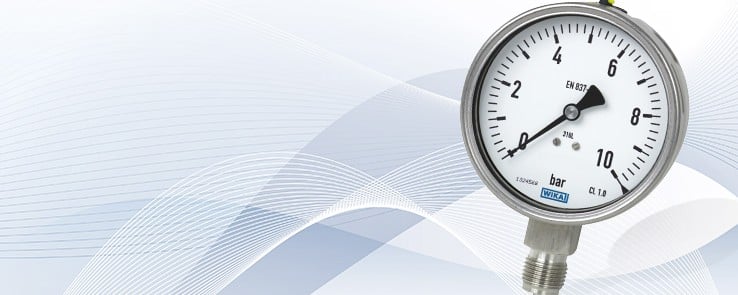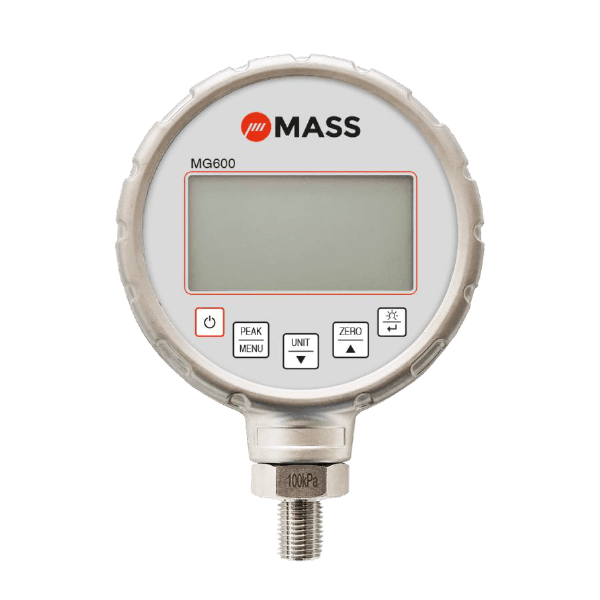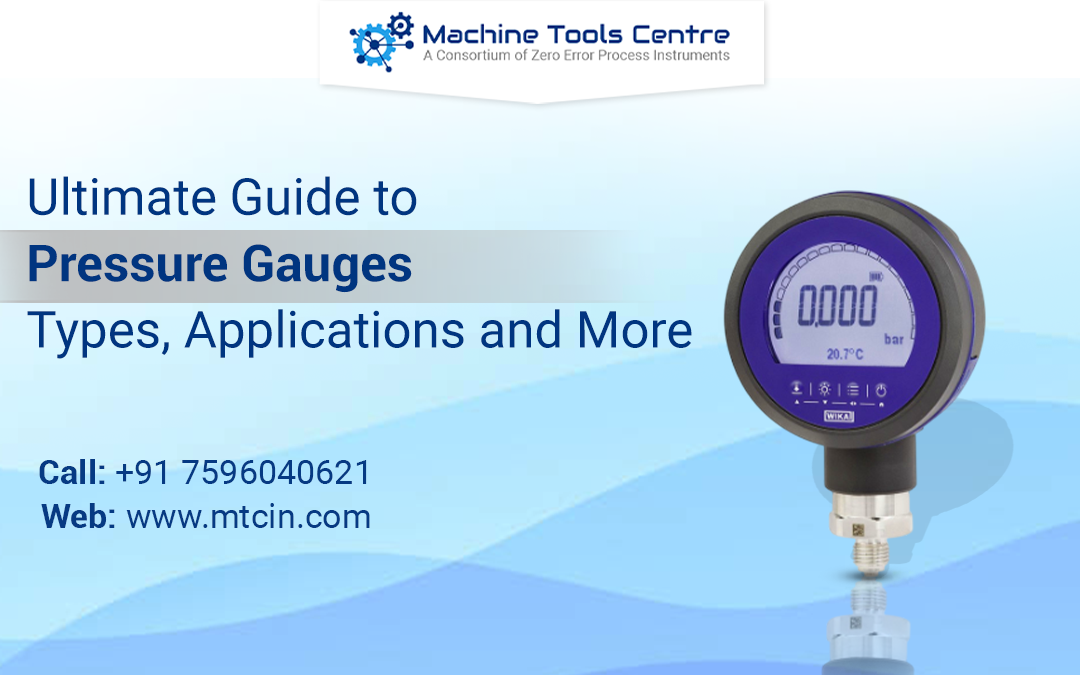In a world where precision and safety are non-negotiable, the tools you depend on matter more than ever. One such tool is the pressure gauge — often small but huge in impact. Whether you’re managing industrial systems, testing equipment, or ensuring things run smoothly, having the right pressure gauge can make all the difference.
In this blog, we’ll explore what makes pressure gauges essential across various industries. We’ll break down the different types of pressure gauges available today—from mechanical to digital—and highlight their unique features and applications.
What Is Pressure Gauges?
A pressure gauge is a device used to measure the pressure of a gas or liquid within a system. It provides a visual reading of the pressure level, which is essential for monitoring and maintaining equipment performance, providing safety, and preventing damage due to overpressure or underpressure conditions. Pressure gauges are commonly used in a wide range of industries, from manufacturing and HVAC systems to automotive, laboratory research, and even household appliances.

There are various types of pressure gauges, including mechanical (analogue) and digital models, each with unique features suited to different applications. Mechanical gauges often feature a dial with a needle that moves according to the pressure, while digital gauges display pressure readings electronically. Regardless of the type, pressure gauges help operators maintain optimal pressure levels in pipelines, tanks, pumps, and other pressurised systems. Properly using and maintaining a pressure gauge is crucial to providing safety, preventing accidents, and improving the efficiency of equipment.
Types of Pressure Gauges: Choosing the Right One for Your Needs
There’s no one-size-fits-all solution when it comes to pressure gauges. Different types are designed for specific applications, environments, and accuracy requirements.
Here’s a quick overview of the most common types:
- Bourdon Tube Pressure Gauge: A widely used mechanical gauge, it features a coiled tube that straightens as pressure increases. Common in industries like manufacturing and oil & gas, it provides reliable, cost-effective measurements.
- Diaphragm Pressure Gauge: With a flexible diaphragm that bends under pressure, this gauge is ideal for low to medium-pressure applications involving viscous fluids or gases with solid particles.
- Capsule Pressure Gauge: Featuring a capsule-shaped element that expands or contracts with pressure, these gauges are perfect for low-pressure systems such as HVAC or food processing.
- Digital Pressure Gauge: Offering an electronic readout, digital gauges provide high accuracy and additional features like data logging and remote monitoring. Ideal for high-precision industries like laboratories and aerospace.
- Manometer: Simple and easy to use, manometers are commonly used for measuring air or gas pressure in HVAC systems and laboratories.
- Differential Pressure Gauge: Measures the pressure difference between two points in a system, essential for monitoring filtration systems, pumps, and airflow.
- Vacuum Pressure Gauge: Designed to measure negative pressures or vacuums, these gauges are commonly used in laboratories and industrial vacuum systems.
- Electric Pressure Gauge: These use electronic sensors for continuous monitoring, often found in automation and high-tech manufacturing environments.
- Air Pressure Gauge: Specifically designed for measuring air pressure in a wide range of systems, air pressure gauges are commonly used in automotive, HVAC, and pneumatic systems. They provide accurate readings to provide optimal air pressure for performance and safety.
- Bellow Type Pressure Gauge: The bellow-type gauge uses a series of expanding bellows that react to pressure changes, converting the motion into a readable measurement. These are commonly used for low-pressure applications and are highly effective for measuring gases and steam.
Choosing the right pressure gauge provides accurate readings, better system performance, and improved safety. Consider factors like pressure range, material compatibility, and your specific application to find the best tool for your needs.

Benefits of Using the Right Pressure Gauge
Using the correct pressure gauge brings numerous benefits:
- Enhanced Accuracy: Accurate pressure readings are essential for maintaining the integrity of equipment and systems. Using the right gauge ensures that measurements are precise, reducing the chances of errors that could lead to overpressure or underpressure conditions. This, in turn, helps avoid costly equipment failures or accidents.
- Improved System Efficiency: A pressure gauge that provides accurate readings enables operators to adjust pressure levels in real-time. Whether it’s maintaining optimal pressure in a pump or ensuring air pressure in pneumatic systems is correct, proper monitoring leads to better performance and energy efficiency.
- Increased Safety: Many systems, such as boilers, pipelines, and HVAC systems, operate under high pressure. Incorrect pressure readings can lead to system failure or safety risks like explosions. Using a reliable, properly calibrated pressure gauge helps prevent dangerous situations by ensuring that pressure remains within safe operating limits.
- Cost Savings: By using the right pressure gauge and maintaining accurate pressure levels, you can avoid costly repairs, system downtime, and energy waste. Investing in high-quality gauges ensures that your systems operate at their best, saving money in the long run.
How to Maintain and Calibrate Your Pressure Gauge for Optimal Performance
Proper maintenance and calibration are key to getting the most out of your pressure gauge. Regularly maintaining your gauge can extend its lifespan, improve its accuracy, and prevent malfunction during critical operations.
Here’s how to keep your pressure gauges in top shape:
- Regular Inspection: Check the gauge periodically for signs of wear or damage. Ensure that the dial, needle, or digital display is clear and easy to read. Look for any cracks or leaks around the casing, which could compromise the gauge’s performance.
- Cleaning: Keep the gauge clean and free from dust, dirt, or corrosion that can interfere with its readings. Use a soft cloth or appropriate cleaning solution for the job. For gauges used in harsh environments, special protective coatings or cases may be necessary to protect them from chemicals or extreme temperatures.
- Calibration: Over time, pressure gauges can drift from their original calibration. Periodically recalibrate your gauge using a reference standard to ensure it is providing accurate readings. This is especially important in industries like pharmaceuticals, aerospace, or manufacturing, where precision is critical.
- Test for Leaks: Test for leaks in the system periodically, especially if the gauge shows irregular readings. Small leaks can lead to inaccurate measurements and pose safety risks. Using a leak detector to check for gas or liquid leaks can save you from larger, more expensive issues down the road.
- Proper Storage: When not in use, store pressure gauges in a clean, dry area where they won’t be exposed to extreme temperatures, humidity, or chemicals. This will help prevent damage and maintain their accuracy over time.
Real-World Applications of Pressure Gauges Across Industries
Pressure gauges are crucial tools in many industries, each with unique demands for safety and performance.
Here are some key applications:
- Oil and Gas: Pressure gauges monitor pipeline, tank, and well pressure, preventing failures like leaks or explosions. Bourdon tube and differential pressure gauges are commonly used for safety and efficiency in extraction and refining.
- Automotive: Used to check tyre pressure, engine systems, and fuel lines, pressure gauges help maintain safety and fuel efficiency. Both digital and analog gauges are standard tools in automotive workshops.
- HVAC Systems: Pressure gauges ensure optimal refrigerant pressure and airflow, improving energy efficiency and system longevity. Diaphragm, capsule, and digital gauges are widely used in HVAC systems.
- Pharmaceutical and Food Processing: Accurate pressure monitoring is essential for product quality and safety. Digital pressure gauges are used in clean rooms and production lines to maintain precise pressure levels and prevent contamination.
- Water Treatment and Utilities: In water treatment plants, pressure gauges help monitor filtration systems and pumps, providing efficient processing, detecting leaks, and reducing energy waste.
Your Input Matters – Share Your Needs
Choosing the Right Pressure Gauge
Choosing the right pressure gauge is critical for ensuring accurate pressure readings, better system performance, and improved safety. Whether you’re dealing with high-pressure systems in oil and gas or low-pressure environments in HVAC, understanding the different types of gauges — from Bourdon tube and diaphragm gauges to digital and air pressure gauges — helps you make an informed decision.
When selecting the right pressure gauge for your needs, consider factors such as pressure range, material compatibility, environmental conditions, and required accuracy. Whether you’re maintaining industrial machinery, testing equipment, or ensuring safe operations in delicate processes, the right gauge will provide optimal performance, reduce risks, and ultimately enhance system efficiency.
By selecting the correct tool for your system, you’ll provide long-lasting, accurate measurements and a smoother, safer operational experience.

Conclusion
In today’s fast-moving industries, precision and safety are more important than ever. Pressure gauges are essential tools in keeping things running smoothly, whether it’s monitoring pipeline pressure in the oil and gas sector, providing the proper tyre pressure in the automotive industry, or managing airflow in HVAC systems. Choosing the right pressure gauge for your specific needs is the first step toward improving system performance, avoiding costly repairs, and creating a safer environment for everyone involved.
But it doesn’t stop at selection — maintaining and calibrating your pressure gauges is just as crucial. Regular inspections, cleaning, and calibration help ensure that your gauges continue to deliver accurate readings, keeping your systems in top shape and reducing any potential risks down the line.
Ready to Boost Your System’s Efficiency?
Choosing the right pressure gauge is important, but knowing how to use and maintain it is what really makes a difference. At MTC (Machine Tools Centre), we’re here to guide you through every step of the process. Whether you need help picking the right pressure gauge or are looking for expert advice on automation solutions, our team is dedicated to supporting you with tailored, practical solutions.
Contact MTC today to learn how we can help you optimise your systems and provide peak performance with the accuracy and safety you need. Let’s work together to take your operations to the next level!
FAQs
What is a Pressure Gauge Used for?
A pressure gauge measures the pressure of gases or liquids within a system to ensure they are within safe operating limits. It helps monitor performance and prevent damage or system failure due to overpressure or underpressure.
How Do I Choose the Right Pressure Gauge?
Choose a pressure gauge based on factors like the pressure range, material compatibility, environmental conditions, and accuracy required for your specific application, whether it’s for industrial machinery, HVAC systems, or automotive use.
What’s the Difference Between a Mechanical and a Digital Pressure Gauge?
Mechanical gauges use a dial and needle to display pressure readings, while digital gauges provide electronic readouts, often offering more precision and advanced features like data logging and remote monitoring.
How Often Should I Calibrate My Pressure Gauge?
Pressure gauges should be calibrated periodically, depending on usage and industry standards. In high-precision industries, calibration may be needed more frequently to maintain accuracy.
What Industries Use Pressure Gauges?
Pressure gauges are used in a variety of industries, including oil and gas, automotive, HVAC, pharmaceuticals, food processing, water treatment, and many others that require precise pressure measurement for safety and efficiency.




